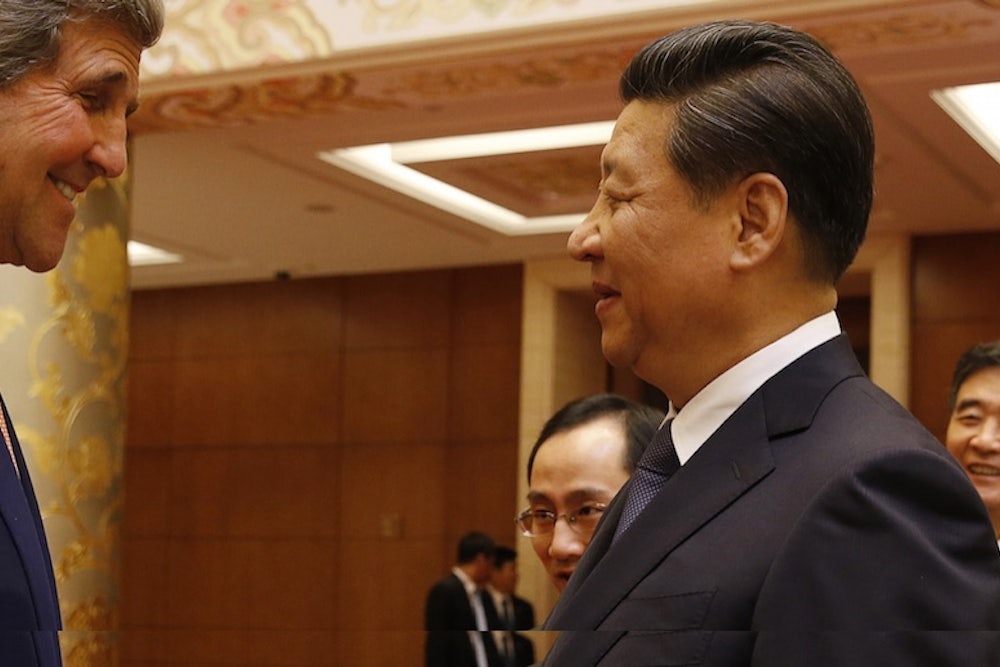Last month, China showed its cooperative side to the international community. It struck an ambitious climate deal with the U.S. that President Xi Jinping announced alongside President Obama. It took a seat at the P5+1 talks in Vienna to negotiate a path forward for Iran’s nuclear program. And it responded to the United Nation’s call for aid to Ebola-ravaged West Africa by sending an elite unit of People’s Liberation Army troops and aid workers. “That’s global leadership, and that’s important, and that cooperation with us is more than welcome,” Secretary of State John Kerry said in early November of China’s increasing role in international crises.
But this doesn't mean China’s buying fully into the West's international order. This week, the country ignored a deadline to submit a response to a case filed by the Philippines in international court that contested Beijing’s broad territorial claims in the South China Sea. For decades, China has staked out a huge swatch of the valuable seascape, ignoring the territorial claims of Vietnam, the Philippines, Malaysia and Brunei. In March, fed up with stalled negotiations and fishing boat scuffles, the Philippines filed a 4,000-page memo to the U.N. requesting arbitration of the contested territory. Beijing had until Monday to submit a response in The Hague, and by refusing to do so it scuttled the potential for international arbitration of the conflict.
The missed deadline was not a surprise. On December 7, Beijing issued a position paper that denied the international court’s legitimacy in arbitrating the disagreement. China argued that a series of agreements dating back to 1995 bound Manila to engaging in bilateral negotiations to solve the dispute, and that finding alternative solutions—even almost 20 years later—was impermissible. At a press conference on Monday, Chinese Foreign Ministry Spokesperson Qin Gang elaborated, “The Chinese side specifies in the position paper that it will neither accept nor participate in the so-called South China Sea arbitration unilaterally initiated by the Philippines, and that the arbitral tribunal does not have jurisdiction over this case.”
China has exclusively pursued bilateral negotiations over the South China Sea because it allows Beijing to intimidate, one by one, the smaller countries with competing claims to the region. And though the other claimants have tried to present a united front via the Association of Southeast Asian Nations (ASEAN), the majority of the ten-member association doesn’t have a direct stake in the territorial conflict and would rather preserve relations with China. Beijing’s refusal to participate in international arbitration parallels its history of only negotiating in situations where it has the upper hand.
Xi’s hardline stance in the South China Sea shows that China is interested in international cooperation when it serves its own interests. For example, Beijing has expressed greater interest in fighting terrorism abroad because it increasingly worries about homegrown terrorism in its restive Xinjiang province. Chinese aid to Ebola-stricken African countries was surely incentivized by massive amounts of Chinese business investments in the region. And aggressively scaling back carbon emissions falls in line with the CCP’s goals for China, anyway. Beijing hopes to transition the Chinese economy away from manufacturing to industries higher on the development chain, and air pollution has become an uncomfortable domestic political issue.
Of course, Beijing is hardly alone in pursuing international engagements with its own best interests in mind. But global actors must remember that the Chinese ideal for an international system is not the same as the current, Western-designed one. In a wide-ranging speech Xi delivered on November 29, he mentioned his desire to “reform the international system and global governance, and increase the representation and say of China and other developing countries.” Beijing’s ideal U.N. would place an even higher premium on sovereignty—which benefits a country that doesn’t think much of human rights and has enough economic clout to bully its neighbors. As friendly as Beijing has been recently to the international community, it is certainly no friend of the international order.
